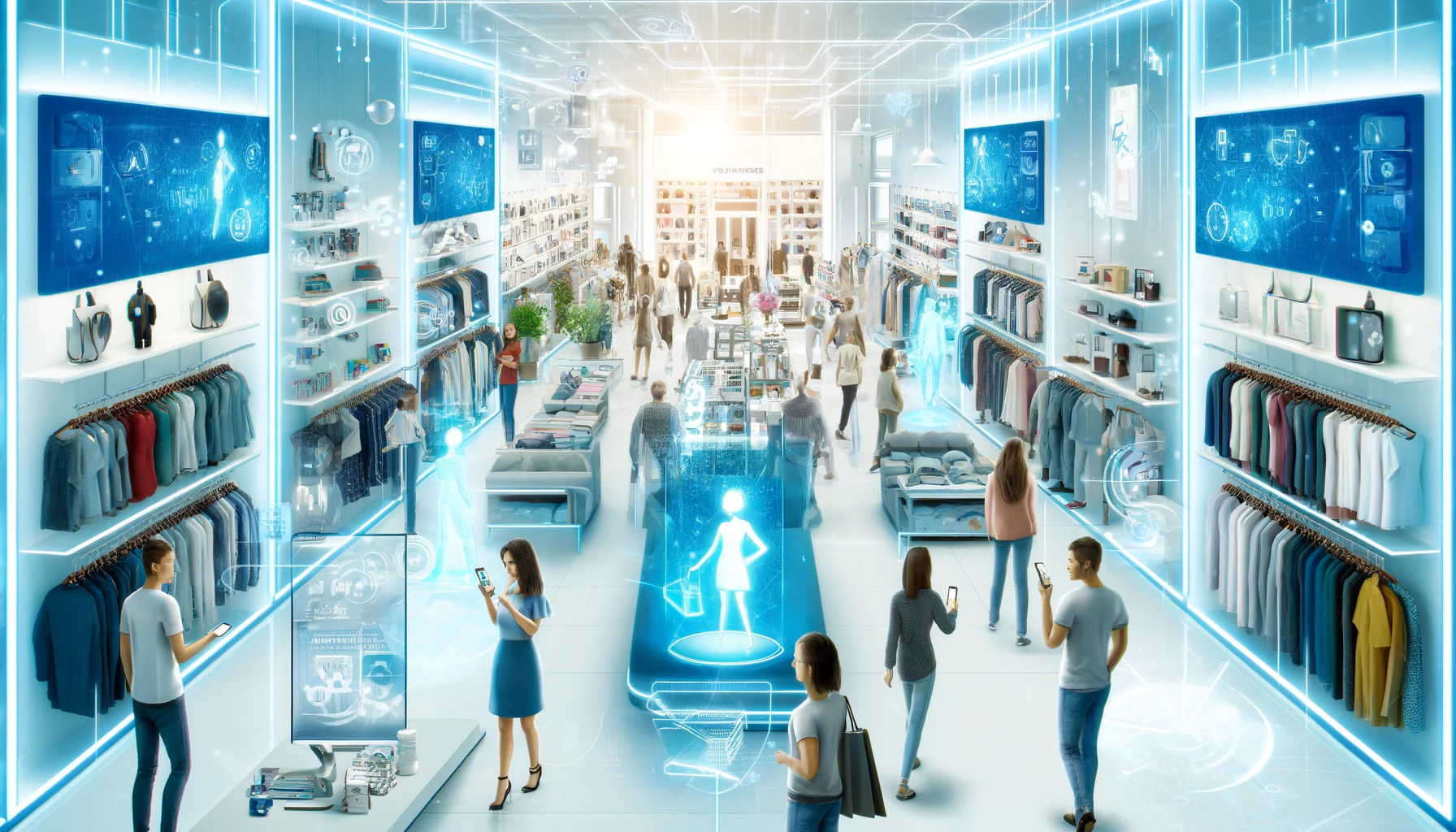Picture a world where your shopping experience is as personalised as your playlist or your social media feed. Just as your favourite streaming service knows exactly what song to play next or which news to show you, imagine if a store could anticipate what products you might like, the deals you would appreciate, or even suggest a gift for a friend’s upcoming birthday based on their tastes. This is not a vision of a distant future—it’s happening right now with Artificial Intelligence (AI) reshaping retail shopping.
AI in retail is like having a personal assistant who knows your preferences and budget just as well as you do, if not better. This assistant doesn’t just follow you around a store but integrates seamlessly into your online and offline shopping experiences, offering recommendations and solutions before you even realise you need them.
From virtual dressing rooms to AI-driven customer support, the technology is enhancing every facet of consumer interaction, making shopping not only more personalised but also more efficient and enjoyable.
In this blog, we’ll dive into how AI is transforming the personal shopping experience, making it richer and more responsive. We’ll explore the mechanisms of this technology and the myriad ways it’s being applied in the retail sector.
AI and the New Age of Personalised Shopping
- Understanding AI in Retail
AI in retail encompasses a range of applications, from backend inventory management to front-end customer engagement. However, its most transformative impact is perhaps in personal shopping, where it leverages data to tailor experiences.
By analysing a customer’s past purchases, browsing history, and even social media activity, AI can predict what products a customer might like and present them at just the right moment.
- Enhanced Customer Interactions
One of the standout applications of AI in retail is in enhancing customer interactions. AI-powered chatbots and virtual assistants provide 24/7 customer service, handling everything from basic inquiries about product availability to complex questions about product specifications.
These systems learn from each interaction, continually improving their responses and providing a level of personalised attention that was previously only available during face-to-face interactions.
- The Magic of Machine Learning
Machine learning, a subset of AI, allows systems to improve their accuracy over time without human intervention. In the context of personal shopping, this means that the more you shop, the better the AI becomes at predicting what you’ll love next.
It’s like having a personal stylist who learns your preferences so well that they know your tastes better than you do.
“AI is revolutionising the retail experience by providing a level of personalisation that was unimaginable a decade ago,” says Emily Roberts, a retail industry analyst.
Delving Deeper: AI Technologies at Work in Retail
- Virtual Try-Ons and Smart Mirrors
Imagine walking into a store and instead of carrying piles of clothes to try on, you simply stand in front of a smart mirror. This mirror, equipped with AI, allows you to virtually try on different outfits by superimposing them on your reflection.
It can even suggest alterations, accessories, or complementary pieces based on the outfit you choose. Online, virtual try-on apps use your camera to show how different products, like glasses or makeup, will look on you, significantly enhancing the online shopping experience.
- Personalised Recommendations
AI’s ability to analyse vast datasets is not just about improving efficiency but also about creating a unique shopping journey for each customer. Retailers use AI to offer personalised product recommendations based on shopping habits, preferences, and even current trends.
This technology is akin to a personal shopper who not only knows your closet inside out but also understands your upcoming needs, perhaps even before you do.
- Dynamic Pricing and Promotions
Dynamic pricing algorithms adjust the price of products in real time based on demand, availability, customer profiles, and purchasing behaviour. This AI-driven approach ensures that customers are offered the best possible deal while also maximising profitability for retailers. Similarly, promotions can be personalised to offer discounts on items that you are more likely to purchase, increasing customer satisfaction and loyalty.
Real-world Applications: AI in Action
- Case Study: Sephora’s Virtual Artist
Sephora’s Virtual Artist app uses AI to analyse your face and skin tone, allowing you to see how different makeup products will look on you. This tool not only enhances the online shopping experience but also drives in-store visits as customers come in to purchase products they’ve tried on virtually.
- Retail Giant Amazon’s AI Influence
Amazon uses AI extensively to enhance customer experiences. Its recommendation engine is perhaps the most well-known, suggesting products based on your browsing and purchasing history. Amazon’s AI algorithms also optimise inventory management and logistical operations, ensuring that your orders are delivered as quickly as possible.
- Engaging Element: Interactive AI Quiz
An interactive quiz that helps you determine your shopping style and then provides personalised product recommendations could be featured on retail websites. This fun element keeps customers engaged and enhances the personal shopping experience with AI.
The Future of AI in Retail: Prospects and Challenges
- Predicting the Next Wave of Innovation
As AI technology continues to evolve, its integration into the retail sector is expected to deepen. Future advancements might include fully automated stores where AI not only assists but manages entire retail operations, from stock replenishment to customer service, all without human intervention. Imagine walking into a store, picking up what you need, and simply walking out, with AI handling payment and inventory updates seamlessly.
- Enhanced Data Integration
Looking ahead, AI will likely become even more sophisticated in how it integrates and interprets data from diverse sources. Beyond analysing purchasing history or web browsing habits, AI might incorporate real-time data streams from social media, current events, or even weather forecasts to offer hyper-personalised shopping experiences that anticipate a customer’s needs before they step into the store or log onto a website.
“The future of retail isn’t just automated; it’s anticipatory. AI will know what customers want before they do, transforming shopping from a task into an experience,” states John Harper, a futurist specialising in retail technologies.
Addressing Challenges and Ethical Considerations
- Privacy and Data Security
As retailers collect and analyse increasingly detailed data about consumers, the potential for privacy breaches grows. Ensuring robust data security measures and transparent privacy policies will be paramount. Retailers will need to balance the drive for personalisation with respect for consumer privacy, navigating complex ethical and regulatory landscapes.
- Bridging the Human-AI Gap
While AI can enhance the efficiency and personalisation of shopping, maintaining a human touch is crucial. Retailers must ensure that AI complements rather than replaces human interactions, preserving the personal elements that many consumers value, especially in high-stakes purchases or complex customer service scenarios.
- Sustainable AI Practises
As AI systems become more complex, they consume more resources. Developing sustainable AI solutions that minimise environmental impact while maximising efficiency will be crucial for forward-thinking retailers.
Conclusion: Embracing AI in Retail
AI is transforming the retail industry by personalising the shopping experience in ways that were once unimaginable. As we move forward, the integration of AI promises not only to reshape how retailers interact with customers but also to redefine the very essence of shopping. Retailers who embrace AI can look forward to not only increased efficiency and sales but also deeper customer relationships built on a foundation of personalised service.
Ready to see how AI can transform your retail business? At BlueSky Creations, we specialise in implementing cutting-edge AI solutions that can revolutionise your customer experience and operational efficiency.
Our groundbreaking platform MetaOPT taps into Mathematical Optimisation, bridging challenges to data-driven, AI-enhanced solutions. We champion modern optimisation, leveraging the combined might of Mathematical Solver, and AI, heralding a new era of intelligent, informed decision-making ready for tomorrow’s challenges.
So get in touch with us and discover how we can help you navigate the future of retail with confidence and innovation.
FAQs
- What Is AI Personal Shopping?
AI personal shopping refers to the use of Artificial Intelligence technologies to enhance and personalise the retail experience for shoppers. By analysing data about a shopper’s preferences, purchase history, and even current trends, AI can recommend products, customise shopping experiences, and predict future needs, much like a personal assistant.
- How Does AI Enhance the Online Shopping Experience?
AI enhances the online shopping experience by providing personalised product recommendations, optimising search results to better match individual preferences, and offering virtual try-on features. It can also improve customer service by powering chatbots that answer queries and solve issues in real time.
- Can AI Help Reduce Returns in Retail?
Yes, AI can significantly help reduce returns in retail by ensuring that customers receive products that match their preferences and needs more closely. For example, AI-driven sizing tools and virtual try-on apps help customers choose the correct size and style, reducing the likelihood of returns due to poor fit or dissatisfaction.
- What Are the Benefits of AI for Retail Store Owners?
For retail store owners, AI offers numerous benefits, including improved inventory management, enhanced customer insights, increased sales through personalised marketing, and reduced operational costs through automation. AI also aids in creating more efficient supply chains and optimising staffing needs based on predictive analytics.
- Are There Any Privacy Concerns With Using AI in Retail?
Yes, privacy concerns are significant when using AI in retail, as these systems often collect and analyse large amounts of personal data. Retailers must ensure they comply with data protection laws and use data ethically, maintaining transparency with customers about how their information is used and securing it against breaches.
- How Can Businesses Start Integrating AI Into Their Retail Operations?
Businesses looking to integrate AI into their retail operations should start by identifying specific areas where AI can add value, such as customer service, inventory management, or marketing. Partnering with technology providers like BlueSky Creations can offer expert guidance, tailored AI solutions, and support throughout the implementation process.







No comment yet, add your voice below!